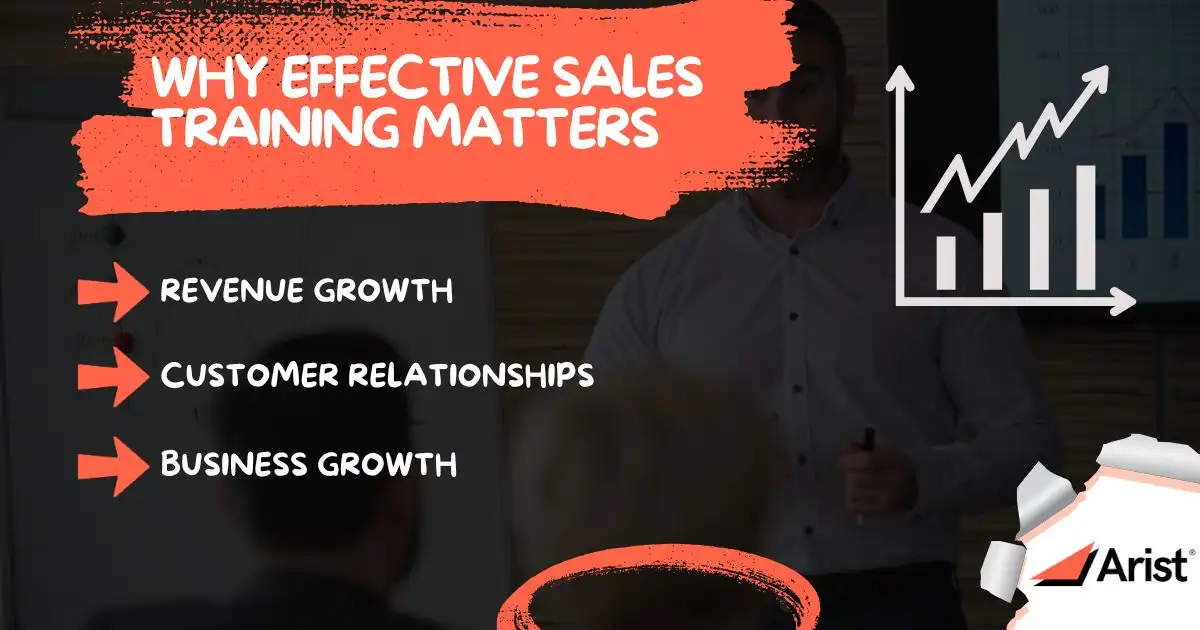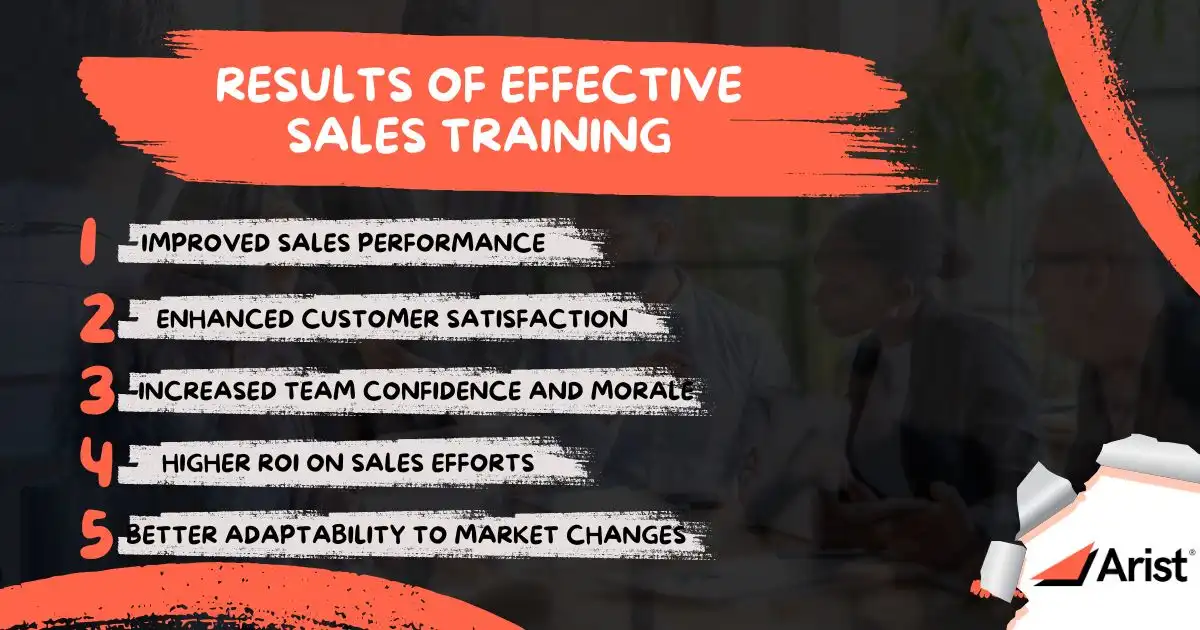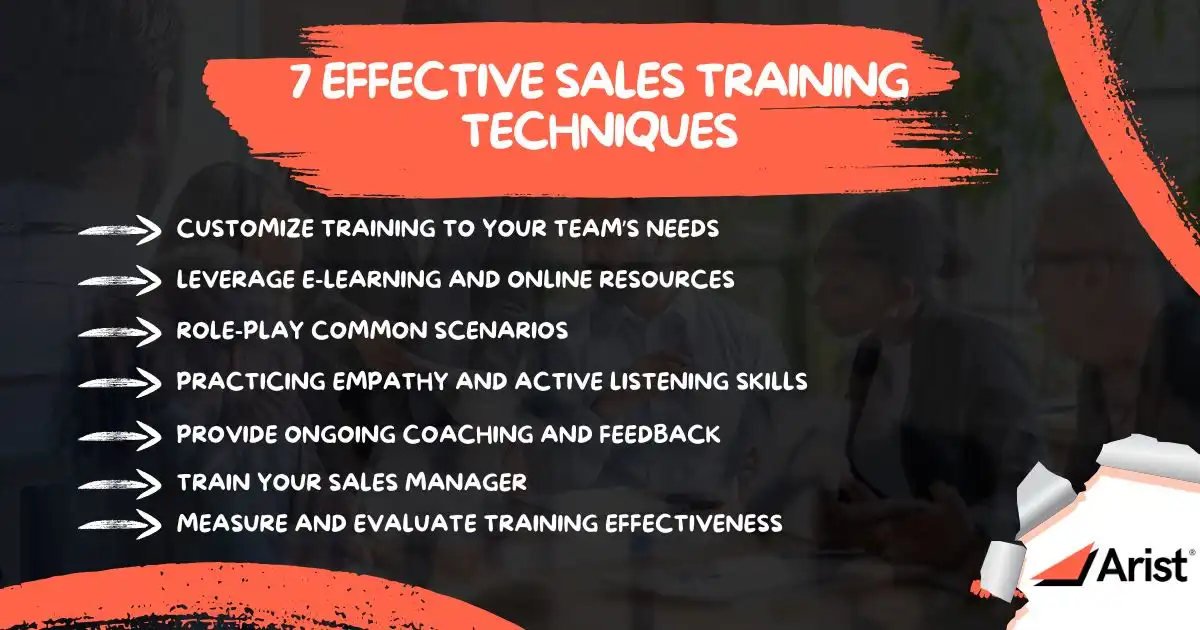Effective Sales Training Methods & Techniques To Level Up Your Sales Team
The market is always on the move, isn’t it? Consumer preferences shift, competitors adapt, and trends appear overnight. Staying stagnant isn’t just risky—it’s a recipe for falling behind. That’s why keeping your sales team sharp with effective training is more important than ever.
Here’s an eye-opener: Taskdrive found that businesses can earn a 353% return on investment (ROI) by training their sales teams. By improving your team’s skills and staying current with market trends, you can protect your business and give your team the tools to succeed—no matter how fast things change.
Why Effective Sales Training Methods Matters

The sales team is one of the main ways customers interact with your business. Their role isn’t just about pitching products—it’s about closing deals and turning potential leads into loyal, paying customers. While marketing and lead generation set the stage, the sales team turns opportunities into results.
And their impact doesn’t stop there. A strong sales team dramatically influences a company’s overall success. Here’s why:
Revenue growth: Sales drive revenue, which is the lifeblood of any business. A high-performing team ensures steady cash flow and helps the company meet its financial goals.
Customer relationships: Sales reps are often the face of the company. A skilled, empathetic salesperson can build trust, create strong connections, and turn first-time buyers into repeat customers.
Business growth: When your sales team succeeds, the whole company benefits. They help you meet short-term goals, open doors to new opportunities, and even enhance your brand’s reputation.
Simply put, a great sales team doesn’t just handle transactions—they shape the company's future. That’s why it’s so important for sales representatives to keep sharpening their skills and adapting to change.
Essential Selling Skills That Every Seller Should Have

To succeed in today’s competitive market, sellers must possess a mix of technical expertise, interpersonal skills, and strategic thinking. Here are some essential selling skills every seller should develop:
Communication Skills
A salesperson’s communication skills can significantly affect customer satisfaction. Sales reps should be able to explain how a product or service solves a customer’s problem—in a way that’s easy to understand and valuable to them. Excellent communication doesn’t just inform; it builds trust.
Product Knowledge
You can’t sell what you don’t understand. Knowing your product inside and out helps you build credibility and answer customer questions confidently. Whether features, benefits, pricing, or real-life applications, being the go-to expert always pays off.
Active Listening
Selling isn’t just about talking—it’s about listening. Truly understanding a customer’s needs shows you care and helps you build stronger relationships. Ask open-ended questions, listen to their responses, and use follow-up questions to clarify what they seek.
Emotional Intelligence (EQ)
Sales can get emotional, especially when customers are frustrated or unsure. A good salesperson can read the room, empathize with the customer’s feelings, and adjust their approach. Building trust starts with understanding how the other person feels.
Negotiation Skills
Closing deals often requires finding a mutually beneficial agreement. Creating win-win scenarios, addressing objections, and knowing when to push or pull back can make all the difference.
Time Management
Sales reps often manage multiple leads, follow-ups, and meetings. They must prioritize tasks, focus on what matters most, and avoid distractions to stay productive.
Problem-Solving Skills
Salespeople face challenges, whether handling unexpected objections or finding creative solutions to customer problems. Being able to think on your feet is a must.
By developing these skills, salespeople can handle almost any situation, build stronger connections, and close deals more effectively. These aren’t just “nice-to-haves”; they’re the tools that can take a good seller and make them great.
Results of Effective Sales Training Methods

What separates good sales teams from great ones? Training. Effective sales training isn’t just about brushing up on techniques but driving measurable results. Proper training makes all the difference, from closing more deals to building long-term customer trust.
Improved Sales Performance
Sales representatives with the right tools, techniques, and knowledge can close more deals, navigate objections effectively, and exceed their quotas.
Example: During training, a sales rep learns to identify customer pain points, which leads to personalized pitches that drive higher conversion rates.
Enhanced Customer Satisfaction
When well-trained reps deliver consistent and professional interactions that put the customer first, they build trust and foster long-term relationships. The result? Happier clients, higher retention rates, and glowing referrals fuel business growth.
Increased Team Confidence and Morale
Training empowers sales teams with the skills they need to face challenges head-on. This newfound confidence improves job satisfaction and creates a motivated, high-performing team.
Higher ROI on Sales Efforts
When training focuses on the latest tools, techniques, and trends, reps can work smarter—not harder. They minimize wasted resources and maximize efficiency, ensuring a higher return on every sales effort.
Better Adaptability to Market Changes
The best training programs emphasize ongoing learning. This keeps sales teams agile, helping them adjust to ever-evolving customer needs, industry trends, and market conditions without skipping a beat.
7 Effective Sales Training Methods & Techniques

1. Customize Training to Your Team’s Needs
Every sales team is unique. From experience levels to specific challenges, a one-size-fits-all approach will not work. Tailor your training program to address your team’s strengths, weaknesses, and goals.
Where to start? Begin by conducting an assessment of both individual and team-wide performance. Identify skill gaps, such as objection handling or CRM mastery, and design training to address those areas.
Customization is essential, but it's hard to do well. To customize training effectively:
Start with a clear goal. What outcome are you aiming for?
Use the 80/20 principle: Which small, impactful 20% changes can drive 80% of the desired outcomes in scaled training?
Rank and identify the top 3 skills someone needs to have to sell your product and focus heavily on those.
For a faster, more efficient approach, tools like Arist’s Creator AI can help you instantly customize training to match your sales team’s specific needs. It takes the guesswork out of building personalized programs, ensuring your team gets the proper training where they need it most.
2. Leverage E-Learning and Online Resources
Only 37% of sales reps utilize CRMs to their full potential. To realize this potential, they need to undergo proper training.
Digital training platforms provide flexible, cost-effective, and scalable solutions to address these knowledge gaps. Unlike traditional training, e-learning tools can deliver consistent, repeatable content that team members can access conveniently. However, the key to success is not just giving your team access to these resources and hoping they figure it out.
Apply the “learning in the flow of work” paradigm to drive adoption and maximize retention. This approach integrates bite-sized, actionable learning experiences into a salesperson’s daily tasks, enabling them to learn without disrupting their workflow. This strategy improves retention rates and accelerates the speed at which new skills are applied on the job.
For instance, platforms like Arist specialize in microlearning, delivering short, impactful training modules directly within the tools or systems your team already uses. Instead of long training sessions, reps can consume small, manageable lessons in minutes, leading to better engagement and comprehension.
Integrating training with real-world use cases, such as CRM tips or best practices embedded directly into their workflows, ensures immediate application and tangible results.
Use spaced learning techniques to reinforce concepts over time. Pair this with real-world scenarios or simulations so reps can apply their skills immediately and build confidence.
Integrating e-learning into daily workflows allows sales teams to develop skills faster and more efficiently. This approach enhances CRM adoption and equips reps with the knowledge and tools to close more deals and drive measurable results.
3. Role-play Common Scenarios
Role-playing is one of the most effective ways to build confidence and refine sales techniques. Use realistic scenarios to help team members practice:
Handling tough objections
Closing deals with confidence
Building rapport with different buyer personas
This hands-on practice sharpens problem-solving skills and ensures reps are ready to tackle real-world challenges.
4. Focus on Practicing Empathy and Active Listening Skills
Customers don’t just want solutions—they want to feel heard and understood. Sales reps who master empathy and active listening can build stronger connections and improve the customer experience.
What to include in training:
Paraphrase what the customer is saying to show they’re listening
Ask thoughtful, open-ended questions to uncover deeper needs
Pay attention to tone, body language, and other non-verbal cues
These skills help your team connect with customers on a deeper level, which leads to better relationships and more successful outcomes.
5. Provide Ongoing Coaching and Feedback
Sales training is not a one-off task. The market changes, customer expectations evolve, and your team needs regular coaching to keep up.
Make it a habit to check in regularly with your team. One-on-one feedback sessions are great for pinpointing what’s working and what needs improvement. Consistent coaching shows your team that you’re invested in their success, which boosts morale and accountability.
6. Train Your Sales Manager
A strong team starts with strong leadership. Your sales managers motivate the team, track performance, and bridge the gap between strategy and execution. That means they need training, too.
Downsides Of A Poorly Trained Manager
Poor leadership leads to confusion, disengagement, and a lack of direction.
Miscommunication results in misunderstandings about goals, strategies, and expectations.
Low team morale leads to frustration, burnout, and dissatisfaction among sales reps.
Without training, managers may struggle to identify or address poor performance effectively, allowing it to persist unchecked.
Poor time and resource management.
Focus on helping managers develop skills like:
Inspiring and leading their team effectively
Breaking down performance metrics to drive results
Supporting reps through coaching and mentorship
When your managers are well-equipped, the whole team performs better.
7. Measure and Evaluate Training Effectiveness
If you don’t measure your training’s impact, how will you know it’s working? Set clear metrics to track improvements, such as conversion rates or deal closing times.
Another tip? Review real-world examples, like recorded sales calls. Watching (or listening to) actual conversations helps reps see what they’re doing well and where they can improve. They can also pick up tips from top-performing teammates.
Elevate Your Sales Team with Arist’s Training Solutions
Effective sales training is essential to keep your team sharp, but traditional methods often disrupt workflows and fail to deliver long-term results. Arist’s microlearning platform transforms training by delivering customized, bite-sized lessons directly through tools like Slack, SMS, and Microsoft Teams. With Arist, your team can upskill seamlessly without pausing their work, ensuring they stay productive while mastering essential sales techniques.
How Arist Supports Effective Sales Training:
Tailored learning: AI-powered customization addresses your team’s specific needs, from objection handling to CRM mastery.
Workflow-friendly training: Lessons are integrated into daily tasks, minimizing disruption and maximizing application.
Improved retention: Spaced learning reinforces key concepts, driving better performance over time.
Real-time insights: Monitor engagement and refine training programs to align with evolving goals.
Ready to level up your sales team? Try Arist today and experience the power of effective, seamless sales training. Book a demo now!
Arist Team
Bring
real impact
to your people
We care about solving meaningful problems and being thought partners first and foremost. Arist is used and loved by the Fortune 500 — and we'd love to support your goals.
Curious to get a demo or free trial? We'd love to chat:


